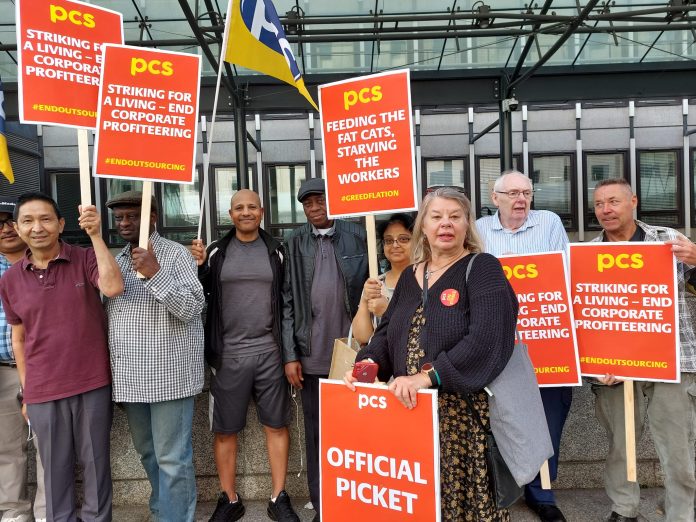Nominate Marion Lloyd and John Moloney for PCS general secretary and AGS
PCS member
Concluding on 31 August, in a month-long all-members ballot, civil service members of the Public and Commercial Services (PCS) union voted on the question: “Do you support the PCS strategy to continue the campaign?” 90% voted ‘yes’ on a 47% turnout.
Despite enormous confusion over what voting ‘yes’ actually meant – confusion actively fostered by the current national leadership of PCS – what is clear is that the vast majority of members think the campaign should continue.
The truth was hidden in the fine print. Voting ‘yes’ actually meant cancelling the union’s strikes, cancelling reballots in the largest government departments (DWP and HMRC), and cancelling the £3-£5 strike levy that union members had been paying since February – actions the leadership had already implemented.
This is not what thousands of members believed that they were voting for.
PCS president Fran Heathcote and deputy president Martin Cavanagh have argued that this vote is an overwhelming endorsement of their strategy.
Socialist Party members in PCS vehemently disagree. At mass meetings of hundreds of members in our various branches, the mood was decisively in favour of continuing the union’s national campaign.
The vote is an overwhelming rejection of the pay increases currently on offer. The £1,500 lump-sum payment for 2022-23, and 4.5-5% for 2023-24, is simply not good enough.
Anger at the government for treating civil servants worse than teachers, senior civil servants, civil servant fast-streamers and other public sector workers is undergirded by a sense of grievance against the union’s current leadership.
The PCS national leadership, drawn predominantly from a faction known as Left Unity, sought to confuse this burgeoning discontent by arguing vigorously that they wanted to continue the campaign, and therefore members should vote ‘yes’ in the ballot. Heathcote, Cavanagh and Co have dishonestly soothed and reassured in answer to questions.
Socialist Party members, and the PCS Broad Left Network (BLN), argued for a ‘no’ vote, but from early on it was clear that the instinctive response of the overwhelming majority of members was to vote ‘yes’ assuming that meant continuing the campaign.
When many members realised the truth, it was too late – once a vote was submitted digitally, there was no way to invalidate it by requesting a replacement ballot, as many tried.
What next?
Having abandoned the hard-won strike mandate that took effect in May 2023, following the government promising a one-time, non-consolidated, pro-rated payment of £1,500, the union leadership ordered that departmental pay negotiations must begin.
But having failed to shift the March 2023 Treasury Pay Remit that capped average pay rises at 4.5% (or 5% for the low paid), and with no way to show teeth during pay talks, this was a recipe for below-inflation pay awards, i.e. pay cuts, for most staff.
This is exactly what we said would happen and it has happened. It was not inevitable and could still be challenged.
Socialist Party members in PCS have repeatedly called for escalation of the campaign through determined national strike action, and for continued targeted action where this is proven to have a significant impact on the government.
Rebuild the campaign
A mandate still exists covering some 50,000 civil servants. We should use this mandate to immediately relaunch the campaign, while simultaneously seeking to renew lapsed mandates for strike action in DWP and HMRC. It can be done. That is what Broad Left Network national executive (NEC) members will argue for.
But it is unlikely that a leadership that waited six weeks to call any action following our strike ballot in November 2022, then waited three months before calling national, all-member strike action, will do it without coming under pressure.
As Cavanagh has indicated clearly in his comments to reps, “the result of the ballot overwhelmingly endorses the strategy of the NEC, which includes pausing action”.
Cavanagh has also suggested that a ballot of all members can be considered to cancel “a decision taken by reps at conference” over the reballot in DWP.
Increasingly, the leadership of the union adapts itself to old right-wing tropes that attempt to divide members from reps, in order to suggest one is disconnected from the other.
Marion Lloyd for general secretary
This continuing abdication of genuine leadership means that we need to seize with both hands the chance we get this year to change the direction of the union, by electing a new general secretary, Marion Lloyd, and by re-electing John Moloney as assistant general secretary.
Marion, a Socialist Party member and national chair of the BLN, is also PCS President in the Business, Energy and Industrial Strategy (BEIS) Group. She has a proven track record as a campaigner and leader of strikes – and from the 2018 discussion on disaggregated strike ballots onwards, she has consistently argued against the current leadership for a coherent strategy for a serious national fightback.
We call on all PCS branches to continue to exert pressure on the NEC to reignite our national campaign, and not to wait until next year.
We ask all branches to call an Emergency General Meeting before 16 October in order to nominate both Marion Lloyd for general secretary and John Moloney for AGS.
- PCS members employed by ISS in the former business department BEIS have started strike action in London. Cleaners, receptionists, security guards, porters and post workers voted to strike by 98.51% on a 69.07% turnout. PCS members are fighting over pay, improvements to conditions and union recognition. The union is also demanding a no compulsory redundancy agreement, and has raised concerns over health and safety and equality issues.
- Marion Lloyd, PCS president of the BEIS group, says: “I stand in full solidarity with our brave striking members at ISS. These members have fought and won before, and will win again!”








